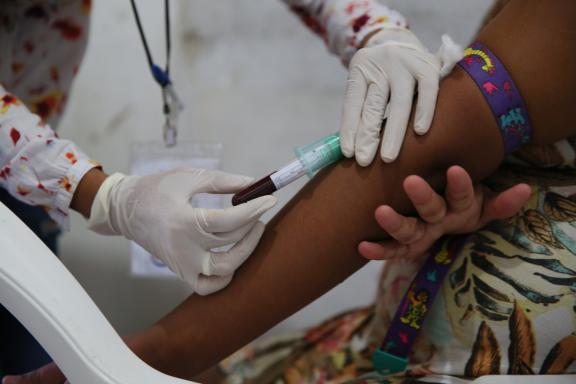
Estimating the prevalence of anemia in populations depends on accurate and precise measurement of hemoglobin (Hb) concentration from blood samples. The type of blood sample used for Hb measurement —capillary or venous—and the device on which the sample is measured—an autoanalyzer or hemoglobinometer like HemoCue® Hb—can result in different Hb values. Furthermore, the precision of Hb estimates also varies by blood sample type. At the population level, differences in mean Hb and the distribution of Hb values can result in inaccurate and unreliable estimates of anemia prevalence.
This webinar provided more information about USAID Advancing Nutrition’s HEmoglobin MEasurement (HEME) project, which has supported a laboratory-based multi-site study (Cambodia, Ethiopia, Guatemala, Lebanon, Nigeria, and Tanzania) to compare Hb measurements from venous, pooled capillary and single-drop capillary blood samples on different HemoCue® Hb models (201+, 301, and 801) against a reference standard. This webinar also presented the rationale, methods, and preliminary results of the study and primary investigators shared their varied experiences in carrying out the study under controlled laboratory conditions. As we move from the laboratory to the field, these experiences will shape our expectations on the accuracy and precision of Hb measurements in population-based surveys, with implications for obtaining reliable anemia prevalence estimates.
Webinar Recording
Webinar Resources
Speakers
- Silvia Alayon (Facilitator), Director, Measurement, USAID Advancing Nutrition
- Omar Dary, Health Science Specialist (Nutrition), Bureau for Global Health, USAID
- Laura Hackl, Former Research Advisor, USAID Advancing Nutrition
- Dora Ines Mazariegos, Researcher, Institute of Nutrition of Central America and Panama (INCAP), Guatemala
- Layal Jaafar, PhD Student, Faculty of Agricultural and Food Sciences, American University of Beirut, Lebanon
- Kidola Jeremiah, Clinical Research Scientist, National Institute for Medical Research, Mwanza Research Centre
- Nirmal Ravi, Chief Innovation Officer, eHealth Africa, Nigeria
- Desalegn A Ayana, Associate Professor, Haramaya University, Ethiopia
- Denish Moorthy, Senior Technical Advisor, USAID Advancing Nutrition